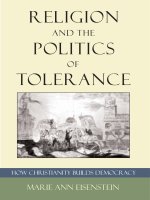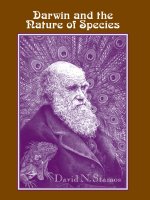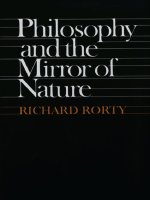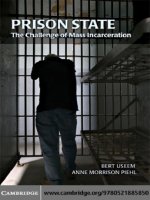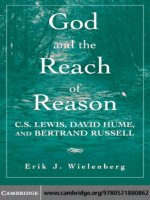0521860466 cambridge university press aristotle and the rediscovery of citizenship may 2006
Bạn đang xem bản rút gọn của tài liệu. Xem và tải ngay bản đầy đủ của tài liệu tại đây (1.71 MB, 206 trang )
Aristotle and the Rediscovery of Citizenship
Aristotle and the Rediscovery of Citizenship confronts a question that is
central to Aristotle’s political philosophy as well as to contemporary
political theory: What is a citizen? Answers prove to be elusive, in part
because late-twentieth-century critiques of the Enlightenment called
into doubt fundamental tenets that once guided us. Engaging the two
major works of Aristotle’s political philosophy, his Nicomachean Ethics
and his Politics, Professor Susan D. Collins poses questions that current
discussions of liberal citizenship do not adequately address. Drawing a
path from contemporary disputes to Aristotle, she examines in detail
his complex presentations of moral virtue, civic education, and law;
his view of the aims and limits of the political community; and his treatment of the connection between citizenship and the human good.
Collins thereby shows how Aristotle continues to be an indispensable
source of enlightenment, as he has been for political and religious
traditions of the past.
Susan D. Collins is assistant professor of political science at the University of Houston. Her research focuses on political thought in classical
antiquity. She has contributed to the American Journal of Political Science
and the Review of Politics, and she is coeditor of Action and Contemplation: Studies in the Moral and Political Thought of Aristotle and cotranslator of Empire and the Ends of Politics: Plato’s “Menexenus” and Pericles’
Funeral Oration.
Aristotle and the Rediscovery
of Citizenship
SUSAN D. COLLINS
University of Houston
CAMBRIDGE UNIVERSITY PRESS
Cambridge, New York, Melbourne, Madrid, Cape Town, Singapore, São Paulo
Cambridge University Press
The Edinburgh Building, Cambridge CB2 8RU, UK
Published in the United States of America by Cambridge University Press, New York
www.cambridge.org
Information on this title: www.cambridge.org/9780521860468
© Susan D. Collins 2006
This publication is in copyright. Subject to statutory exception and to the provision of
relevant collective licensing agreements, no reproduction of any part may take place
without the written permission of Cambridge University Press.
First published in print format 2006
eBook (NetLibrary)
ISBN-13 978-0-511-22634-2
ISBN-10 0-511-22634-9
eBook (NetLibrary)
hardback
ISBN-13 978-0-521-86046-8
hardback
ISBN-10 0-521-86046-6
Cambridge University Press has no responsibility for the persistence or accuracy of urls
for external or third-party internet websites referred to in this publication, and does not
guarantee that any content on such websites is, or will remain, accurate or appropriate.
In memory of my parents
Elizabeth and Thomas Collins
Contents
Acknowledgments
1
2
3
4
5
page ix
Introduction:The Rediscovery of Citizenship
Liberal Citizenship and Aristotle’s Ethics
Liberalism and Its Critics
The Limits of Liberal Citizenship
Aristotle on Law, Education, and Moral Virtue
Citizen Virtue and the Longing for the Noble
Courage as Noble Sacrifice and Self-Concern
Noble Deeds and the Ascent of Virtue
Magnanimity and Virtue as the Highest Good
Justice as a Virtue
Justice as the Lawful
Justice as Fairness
Reciprocity and the Regime
Justice and the Dual Ends of Moral Virtue
Law and Right Reason
Prudence, the Good Citizen, and the Good Life
The Problem of Prudence
Education, Law, and Compulsion
The Political Community as Natural End
Recasting the Question of the Good Life
Citizenship and the Limits of Law
The Identity of the Citizen
Citizenship, Revolution, and the Regime
vii
1
6
7
19
41
47
52
58
61
67
69
71
74
76
80
91
91
98
102
108
119
119
122
Contents
viii
The Good Citizen and the Good Man
Citizenship and the Rule of Law
6
Political Wit and Enlightenment
Nobility and Irony
Politics and Wit
Education, Liberty, and Leisure
Conclusion:Aristotle and the Rediscovery of Citizenship
124
132
147
148
154
160
166
Bibliography
179
Index
189
Acknowledgments
In the course of my education, I have had the support of teachers, colleagues, friends, and family. I dedicate the book to the memory of my
parents, Elizabeth and Thomas Collins, whose love and care for their
children seemed infinite and who were models of decency and humanity. I am especially grateful to two teachers, Leon Craig and Christopher
Bruell; their example and thought continue to inspire me, and I will
always remain in their debt. My gratitude also to the faculty at Boston
College, Robert Faulkner, Susan Shell, and the late Ernest Fortin, who
enriched my studies. Four friends in particular, Monty Brown, Lorna
Dawson, Robert Bartlett, and Devin Stauffer, have made my life and
thought better in every way, and I am very grateful to Lorna and Bob
for their tireless comments on the manuscript in its various phases.
In writing the book, I have also benefited from the advice of several
colleagues and friends. Paul Rahe and Harvey Mansfield assisted at
critical points in the publication process and provided extensive comments on the manuscript. Stephen Salkever, Arlene Saxonhouse, and
Mary Nichols were incisive readers whose suggestions greatly improved
the work. Others have given their support along the way, including
David Bolotin, Matthew Davis, Charles Griswold, John Scott, Lorraine
Pangle, Thomas Pangle, Ty Tessitore, Sandy Thatcher, and Catherine
Zuckert, and I have had the good fortune of wonderful colleagues at
the University of Houston, in particular, Ted Estess, Cynthia Freeland,
Ross Lence, Donald Lutz, Rick Matland, Susan Scarrow, and Robert
ix
x
Acknowledgments
Zaretsky, whose fellowship always managed to lift my spirits. My graduate assistants, Sarah Neal and Carol Brown, cheerfully and expertly
took on every task, however tedious, and made my work so much easier. My warm thanks to the editors at Cambridge, Lewis Bateman and
Beatrice Rehl, who supported the manuscript from the beginning; to
Louise Calabro, who guided it through the production process; and
to Helen Greenberg, whose careful copyediting helped to polish it.
Finally, I want to express my deep gratitude to my husband, Joseph,
and daughter, Isabella. I cannot imagine my life without them; their
existence alone makes it worth living.
Parts of Chapters 2, 3, and 4 appeared in an earlier form in “Moral
Virtue and the Limits of the Political Community in Aristotle’s Nicomachean Ethics” in the American Journal of Political Science 48 ( January
2004). I am grateful to the John M. Olin Foundation for supporting
a critical year’s leave to work on the manuscript and to the Earhart
Foundation for their generous summer support, which helped me to
complete the publication process.
Aristotle and the Rediscovery of Citizenship
Introduction
The Rediscovery of Citizenship
During an interview on the first anniversary of September 11th, author
David Halberstam was suddenly moved to remark, “I used to say I
was a New Yorker. Now I like to think of myself as a citizen of the
city.”1 As a response to the attacks on America’s most cosmopolitan
city, Halberstam’s comment spoke powerfully to the newfound sense
of citizenship that then gripped the nation and has since struggled for
definition. For what, indeed, does it mean to be a “citizen”?
To be sure, the events of September 11th and their aftermath have
impelled all serious observers to speak anew of the sacrifices and duties
of citizenship or of a deeper commitment to community. Beyond
this, however, language often fails. With Rousseau, perhaps, some
had sought to efface the very word citizen from our vocabulary, or,
with Kant, to search out a higher notion of world citizenship, or, with
Hobbes, to rest content as subjects rather than citizens as long as life
and liberty were otherwise preserved. But if, in the face of present challenges, such notions seem inadequate – if, in particular, we are awake to
aspects of citizenship that our own principles and assumptions obscure
or resist – where might we turn for understanding? This study turns to
Aristotle’s Nicomachean Ethics and Politics, the two works in the history
of political philosophy that together contain the most comprehensive
and systematic investigation of the question “What is a citizen?”
1
CNN, “Newsnight with Aaron Brown,” 9 September 2002, Interview with David
Halberstam.
1
2
Aristotle and the Rediscovery of Citizenship
The Aristotelian tradition became almost moribund with the success of modern liberalism and of attacks such as those of Hobbes on
the many “absurdities” of the “old Morall Philosophers,” Aristotle chief
among them. Yet today Aristotle’s thought enjoys a remarkable renaissance. Against the orthodox liberal concept of the state as an association of rights-bearing free agents who contract with one another
for the sake of peace and the pursuit of happiness, scholars are again
taking seriously the idea articulated most fully by Aristotle that human
beings are “political animals.” By giving new currency to the old view
that individuals are naturally situated within a political community that
requires specific virtues, molds character, and shapes its citizens’ vision
of the good, the revival of Aristotelianism has challenged even such
staunch defenders of liberalism as John Rawls to examine again the
sphere of the citizen. This reexamination of citizenship belongs also to
the recent work of scholars as diverse as Alasdair MacIntyre, Richard
Rorty, Amy Gutmann and Dennis Thompson, Michael Sandel, Peter
Berkowitz, Stephen Macedo, William Galston, and Martha Nussbaum.
Yet, for all their diversity, the efforts of these scholars are typically unified by certain liberal presuppositions or ends and, in particular, by the
concern to marry liberal principles of equality and individual freedom
with a more or less Aristotelian view of community.
Although my book begins from current efforts, it does not seek to
duplicate them. In undertaking a study of Aristotle’s account of citizenship, I contend that this account is a source of insight for us precisely
because it does not begin from liberal presuppositions. Aristotle’s presentation of citizenship’s foundation in law and moral virtue is the
classic statement of the preliberal view of political authority and civic
education, according to which the community is prior to the individual
and the highest purpose of the law is the education to virtue. Moreover,
his investigation of citizenship and its connection with virtuous action
and the good life addresses the question that is in principle left open
by liberal thought: the question of the highest human good. Aristotle’s
treatment of these matters clarifies the limitations of the current rediscovery of citizenship, with its distinctive liberal assumptions, as well
as attachments and concerns that persist within our experience and
yet are scarcely acknowledged, let alone explained, by liberal theory.
By illuminating dimensions of citizenship that we either overlook or
obscure, Aristotle invites our rediscovery of citizenship in its own right.
Introduction
3
He thereby helps us to comprehend not only the perspective of cultures or communities that do not share liberal principles, but also the
full significance of the question “What is a citizen?” as an enduring
human concern.
In following Aristotle’s investigation of this question through both
the Nicomachean Ethics and the Politics, my study reflects his view of
the deep connection between ethics and politics and brings into their
proper relation two works that are too often treated apart. Besides
its introduction and conclusion, the book has six chapters. Chapter 1
draws a path to Aristotle’s thought, beginning from the general critique of the Enlightenment and the specific criticisms of Rawls’s influential account of liberalism that opened the door not only to postEnlightenment views but also to the return to Aristotle. I trace in this
context Rawls’s reformulation of his original account – his “political
liberalism” – as well as other current efforts to describe a citizenship
that is robust enough to support political order yet compatible with
individual freedom and equality. In the disputes provoked by these
efforts, two problems have emerged that provide a bridge to Aristotle’s
thought, even as they underline its distinctiveness: first, the priority of
justice, or “the right,” over the good, which remains a crucial but controversial claim of Rawlsian liberalism; and second, the nature of civic
education, which raises difficult questions for scholars who wish to
establish the moral and political supports of liberal politics while preserving a sphere within which individuals can freely pursue the good
as they see fit.
The disputes over these problems indicate the limitations of the
current rediscovery of citizenship and the initial reasons for turning
to Aristotle’s thought. To explore fully the relation between the right
and the good, and the nature of civic education, one must begin from
Aristotle’s treatment of law and the education to moral virtue in his
Nicomachean Ethics. This treatment opens the way to his direct investigation of the meaning and limits of citizenship in the Politics.
The next five chapters proceed thematically, examining in turn the
connection of citizenship with moral virtue, education, and the good,
and its relation to the political community and law. In Chapters 2
and 3, I show that the Nicomachean Ethics offers an account of civic
education that is superior to those currently available, first, because
it acknowledges the authoritative role of the political community and
4
Aristotle and the Rediscovery of Citizenship
the law with regard to education, and, second, because it clarifies how
this education bears on the question of the good. In particular, by
bringing out the moral and political dimensions of the good, Aristotle is able to explore a concern central to human experience that
liberal thought necessarily obscures: the relation between the good
life and the nobility and justice that constitute morally virtuous action.
Aristotle shows that as the educator to virtue, the political community
necessarily elevates this life as best and seeks to reconcile two ends as
proper to right action: the common good and the perfection in virtue
as an end in itself. In his account of the most complete virtue, justice,
he establishes that the deepest problem of civic education is the irrepressible tension between these two ends. Against the claims of the
political community and the law, this difficulty reopens the question
of how one determines the proper end of action and indicates that
the law, for all its authority, cannot be the final arbiter concerning the
good. In contrast to others, I do not believe that Aristotle has or desires
a single solution to the problem of right action. Nevertheless, his careful treatment of this problem comprehends the perfection that is the
highest pedagogic end of the law and illuminates its significance for
our good as citizens and human beings.
My argument then moves to two chapters that focus on Aristotle’s
Politics. In Chapters 4 and 5, I examine the demands and necessities
of citizenship in connection with the question of the good and then
outline more fully Aristotle’s treatment of citizenship in the context of
the political community’s legal prerequisites and natural end. I argue
that while Aristotle gives full due to the political community’s authority
regarding moral virtue and the good, his analysis of the dispute over
distributive justice establishes the boundaries of this authority in every
regime or political order. His precision about these matters further
illuminates the law’s limitations with respect to its pedagogic aims and
reveals the necessity of a move to a natural or transpolitical, as opposed
to a legal or political, perspective on human action and political life.
In his analysis, Aristotle sheds light on the difficulty that may be
most troubling for us as liberal citizens: the potential tension between
the demands of civic devotion and the independence of individual reason. Accordingly, in Chapter 6, I argue that Aristotle sketches a middle
ground between thoughtless or dogmatic commitment to convention
and skeptical alienation from it. The possibility of this middle ground
Introduction
5
emerges in his account of education in the Politics and in his elucidation of an apparently minor moral virtue in the Nicomachean Ethics,
wittiness. Against a view popular today that the tensions, conflicts, and
evils inherent in political life are proof of its tragic and ultimately
incomprehensible nature, I suggest that there is in Aristotle’s political
philosophy a comic vision in the highest sense: a vision, in short, that
appreciates both the nobility and the limits of human striving and that
in no way despairs of wisdom about human affairs. Such a perspective, Aristotle indicates, supports a form of prudence by which citizens
understand and defend the benefits of a decent political community
while remaining clear-eyed about its failings or limitations.
My conclusion returns to the current rediscovery of citizenship to
explore directly the guidance offered by Aristotle. That Aristotle is
not a liberal democrat bears repeating. To mention a few obvious
issues: He lists democracy as a deviant regime, his own best order is
aristocratic, and his treatments of slavery and of the political status
of women and foreigners are hardly models of inclusiveness. But as
antidemocratic as Aristotle’s thought may be in some respects, it does
not suffer from many of our own blind spots and frequently speaks to
our most serious concerns. Indeed, for all the clear goods of a liberal
order, recent events have underscored that citizenship does not simply confer benefits but requires sacrifices, and involves not only rights
but also duties – in short, citizenship frequently asks not what your
country can do for you, but what you can do for your country. For us,
then, Aristotle’s treatment of the relation between individual and community, the connection between justice and the good, and the nature
of civic education elucidates aspects of citizenship that we acknowledge without always exploring and for which liberal theory offers little insight. Moreover, because Aristotle’s investigation of citizenship
addresses the question of the human good with a completeness that
liberal thought necessarily eschews, it offers Halberstam’s “citizen of
the city” a path to understanding the relation between being a citizen
and living well as a human being. By thus challenging us to rediscover
these dimensions of citizenship and to reflect anew on the question
of the good, Aristotle’s political philosophy can be for us, as it was for
thinkers across the Christian, Jewish, and Islamic traditions of the past,
an indispensable source of enlightenment.
1
Liberal Citizenship and Aristotle’s Ethics
The current debate about liberal citizenship is marked by a pervasive
doubt about such fundamental liberal principles as the primacy of the
individual, the neutrality of the contractual state, and the priority and
universality of rights. To be sure, there have been past disputes about
the political and legal terms of citizenship. In the American case, for
example, disputes have ranged from the arguments concerning naturalization at the Constitutional Convention to the battle over voting
rights to more recent discussions of immigration. But these past disagreements also reflected a more fundamental consensus that “the
first mark of American citizenship,” and of liberal citizenship in general, is the “political equality of rights,” and that defining citizenship
largely entailed working out the full meaning of these terms.1 Since
the current debate follows from critiques of liberal thought itself, however, we now confront fundamental questions concerning the very ideals and principles that have traditionally undergirded discussions of
citizenship.
In providing an overview of these critiques and the ways in which
scholars have subsequently sought to reconceive liberal citizenship, I
seek not to recapitulate this ongoing debate but to describe the general context within which it has arisen and to draw out problems that
provide a bridge to Aristotle’s thought. I begin from two developments.
1
Judith Shklar, American Citizenship: The Quest for Inclusion (Cambridge, MA: Harvard
University Press, 1991), p. 1.
6
Liberalism and Its Critics
7
First, in the last decades of the twentieth century, a growing perception that liberal thought, and the Enlightenment project in general,
failed to make good on its promise to ground morality in a rational
and nonteleological framework raised serious doubts about liberalism’s capacity to defend its own moral and political principles. These
doubts opened the way to a return to the Aristotelian tradition that the
Enlightenment had rejected, as well as to post-Enlightenment views.2
Second, criticisms of Kantian moral philosophy and of John Rawls’s
influential Kantian politics in A Theory of Justice raised questions about
the relation between the individual and the political community that
have significantly shaped the present efforts to reconceive citizenship.
liberalism and its critics
The remarkable renaissance of Aristotle’s thought in the late twentieth century was made possible in part because of doubts arising within
the tradition of liberal thought. In returning to classical philosophy,
neo-Aristotelianism represents a break with what Stephen Salkever
has called “the intransigently antiteleological character” of liberalism’s
“founding texts.”3 But as a sketch of some of the developments leading
2
3
The school of thought having its inspiration in Aristotle is wide and diverse, and while
I hope to capture some of this breadth and diversity in the notes, my discussion in the
text is limited by my immediate purposes. I therefore confine my references to the
works of several well-known thinkers involved in the revival of Aristotle’s thought in
the 1980s and 1990s. More detailed critical surveys of the rise of Aristotelianism, and
the related return to an ethics of virtue, include Gregory Trianosky, “What Is Virtue
Ethics All About?,” American Philosophical Quarterly 27 (October 1990): 335–44; Peter
Simpson, “Contemporary Virtue Ethics and Aristotle,” Review of Metaphysics 45 (March
1992): 503–24; and John C. Wallach, “Contemporary Aristotelianism,” Political Theory
20 (November 1992): 613–41. Volume XIII of Midwest Studies in Philosophy (Notre
Dame, IN: University of Notre Dame Press, 1988) contains representative articles.
Salkever, “‘Lopp’d and Bound’: How Liberal Theory Obscures the Goods of Liberal
Practices,” in Liberalism and the Good, eds. R. Bruce Douglass, Gerald R. Mara, and
Henry S. Richardson (New York: Routledge, 1990), p. 167. See also Alasdair MacIntyre,
“The Privatization of the Good: An Inaugural Lecture,” Review of Politics 52 (Summer
1990): 348 and After Virtue: A Study in Moral Theory (Notre Dame, IN: University of
Notre Dame Press, 1981), p. 54; Michael Sandel, Liberalism and the Limits of Justice, 2nd
ed. (Cambridge: Cambridge University Press, 1998), p. 175. For fuller discussions of
liberalism and the question of teleology, see Salkever’s Finding the Mean: Theory and
Practice in Aristotelian Political Philosophy (Princeton, NJ: Princeton University Press,
1990), pp. 21–36; William Galston, Justice and the Human Good (Chicago: University
of Chicago Press, 1980), ch. 2 and Liberal Purposes: Goods, Virtues, and Diversity in the
Liberal State (Cambridge: Cambridge University Press, 1991), chs. 4–7.
8
Liberal Citizenship and Aristotle’s Ethics
up to it indicates, this break resulted less from a reevalution of ancient
teleology than from critiques that called into question liberalism’s own
moral and political principles. For, alongside Aristotle’s natural philosophy, early liberals such as Hobbes and Locke jettisoned also the
classical view that the end of government is the human good, understood as virtue and the perfection of human nature. Armed with a
new mechanistic and materialistic science of nature, they sought to
comprehend the brute facts of our original or prepolitical condition –
the “state of nature” – and especially what they saw to be the inevitable
conflict or war among human beings in the pursuit of their individual goods, within a political compact whose central purposes were
the protection of its members from harm, regulation of their various
interests, and preservation of their natural freedom. Despite abandoning an overarching idea of the human good, then, early liberalism
sought to establish natural and rational principles for ordering civic
life. Although in the state of nature the pursuit of our individual good
has no moral import of its own, it becomes a matter of moral and
political import when we enter into association with one another, as
we are compelled to do if we desire peace and prosperity. In the face
of the war and oppression that the unbounded pursuit of our desires
would produce, it is both necessary and right to establish an association in which peace and freedom are preserved – in which our natural
freedoms, our rights to life and property, for example, are enjoyed in
the fullest way without harm to others. From this point of view, the
main tasks of government become the regulation of competition and
protection of individual freedom, and the central problem of politics,
the abuse of power.
Liberalism’s story, however, is only just beginning. Under the influence of later Enlightenment thinkers on both sides of the English
Channel – with Rousseau and Montesquieu and Hume and Burke
as obvious exemplars – and with the rise of Romanticism, German
Idealism, and Marxism in the eighteenth and nineteenth centuries,
the view of nature and human nature grounding the denial of a highest
human good succumbed first to an emerging and then to a full-blown
sense of the basic historicity of human existence. Under this new dispensation, human nature came to be seen as a product of and not a
constant within the continual flux of time and events. More generally,
Liberalism and Its Critics
9
the idea of nature itself appeared as a salutary myth, a conceptual
fabrication for the purposes of justifying the liberal ideal of the state.
This new sense of our historicity obviously did not allay but deepened
doubt concerning the existence of a highest human good – in a world
of flux, the good or happiness too is radically contingent – yet, more
importantly, it eventually also engulfed the principles informing liberal politics itself. It thus darkened liberalism’s horizon with a new
thought. For although Kant and Hegel sought to show that our status as historical beings need not undercut the possibility of a rational
moral or political order, if indeed reason can stand above the historical flux, contemporary scholars began to grapple also with the more
radical views of Nietzsche, Heidegger, and their intellectual heirs. To
recall Alasdair MacIntyre’s influential formulation in After Virtue, the
view drawn out by Nietzsche (and his “emotivist and existentialist successors”) is that “all rational vindications of morality manifestly fail
and that therefore belief in the tenets of morality needs to be explained
in terms of a set of rationalizations which conceal the fundamentally
non-rational phenomena of the will.”4
In rejecting the tradition of which Aristotle was the core, the Enlightenment claimed to be able to ground a new, if leaner, morality in true
science and rationality. But liberalism’s deepening skepticism, following the break with the ancient tradition, finally called into question
its own principles of justice and morality. This development has been
greeted by some as a crisis and by others as a liberation. According to
MacIntyre, for example, the failure of the Enlightenment to secure a
rational foundation for moral consensus and political life means that
the liberal tradition cannot defend against challenges to the public
authority and a disintegration of individual life into self-absorption
and private gratification – if everything is permitted, then anything
goes.5 Arguing that “the defensibility of the Nietzschean position turns
4
5
MacIntyre, After Virtue, p. 117 (emphasis in text).
The effort to reform moral and political life gave rise to the communitarian movement with which many contemporary Aristotelians are identified. But the terms “neoAristotelian”, “communitarian,” and “liberal” are somewhat amorphous in their application to any one position. Even those who would identify themselves as liberal might
yet argue in favor of what Michael Walzer has called a “communitarian correction”
(“The Communitarian Critique of Liberalism,” Political Theory 18 [February 1990]:
10
Liberal Citizenship and Aristotle’s Ethics
in the end on the answer to the question: was it right in the first place
to reject Aristotle?”, MacIntyre has sought to replace liberal theory
with “something like Aristotle’s ethics.”6 Others have pursued less
radical strategies, seeking, for example, to find resources within the
Enlightenment tradition for its defense, to modify liberalism in an
Aristotelian direction, or to rediscover the republican elements of liberal thought. Efforts of this kind are represented by the work of Peter
Berkowitz, Stephen Macedo, William Galston, Martha Nussbaum, and
Michael Sandel.7 Still others, who assert and even celebrate the demise
of Enlightenment metaphysics, strive, like Habermas, to formulate a
“postmetaphysical” but still liberal framework for ethics and politics
or, like Richard Rorty, to search out new possibilities of “individual
6
7
15), and communitarians typically have commitments to certain liberal goals, since,
as Galston observes, “most Anglo-Americans are, in one way or another, liberals; all
are deeply influenced by the experience of life in liberal societies” (Liberal Purposes,
p. 79). As Charles Griswold has noted, “Among those who in some sense wish to return
to the Greeks, there is remarkable consensus that the political offspring of the Enlightenment are, at least in good part, worth preserving. (I refer to liberal institutions and
political arrangements)” (Adam Smith and the Virtues of Enlightenment [Cambridge:
Cambridge University Press, 1999], p. 4). For overviews of communitarianism, see
Amitai Etzioni, ed., Rights and the Common Good: The Communitarian Perspective (New
York: St. Martin’s Press, 1995), and C. F. Delaney, ed., The Liberalism–Communitarianism
Debate (Lanham, MD: Rowman & Littlefield, 1994).
MacIntyre, After Virtue, p. 117 (emphasis in text).
See, for example, Peter Berkowitz, Virtue and the Making of Modern Liberalism (Princeton, NJ: Princeton University Press, 1999); Stephen Macedo, Liberal Virtues: Citizenship, Virtue, and Community in Liberal Constitutionalism (Oxford: Oxford University
Press, 1996) and Diversity and Distrust: Civic Education in a Multicultural Democracy
(Cambridge, MA: Harvard University Press, 2000); Galston, Justice and the Human
Good, Liberal Purposes: Goods, Virtues, and Diversity in the Liberal State (Cambridge:
Cambridge University Press, 1991), and Liberal Pluralism: The Implication of Value
Pluralism for Political Theory and Practice (Cambridge: Cambridge University Press,
2002); Martha Nussbaum, “Non-Relative Virtues: An Aristotelian Approach,” in
Midwest Studies in Philosophy, Volume XIII: Ethical Theory, Character and Virtue, ed.
Peter A. French, Theodore E. Uehling, Jr., and Howard K. Wettstein (Notre Dame,
IN: University of Notre Dame Press, 1988); pp. 32–53, “Human Functioning and
Social Justice: In Defense of Aristotelian Essentialism,” Political Theory 20 (May
1992): 202–46, and “Aristotelian Social Democracy” in Aristotle and Modern Politics: The Persistence of Political Philosophy, ed. Aristide Tessitore (Notre Dame, IN:
University of Notre Dame Press, 2002); Sandel, Liberalism and the Limits of Justice
and Democracy’s Discontent: America in Search of a Public Philosophy (Cambridge, MA:
Harvard University Press, 1996). Malcolm Schofield offers a helpful overview of
several uses to which Aristotle’s political thought has been variously put in Saving
the City: Philosopher-Kings and Other Classical Paradigms (New York: Routledge, 1999),
pp. 100–1.
Liberalism and Its Critics
11
and private spiritual liberation.”8 These challenges to Enlightenment
thought and the attempts to reconceive ethics and politics form the
general context within which the debate about liberal citizenship is
pursued.
At the same time, specific criticisms of Kantian moral philosophy
and of Rawls’s well-known account of liberalism in A Theory of Justice
have significantly shaped this debate. The influence of the Kantian
view in the liberal tradition can be traced in part to Kant’s effort to vindicate morality in the face of liberalism’s own skepticism and, at the
same time, to elevate the liberal claim concerning the fundamental
freedom of human beings.9 In short, according to Kant, the most compelling evidence of human freedom, and the true locus of morality and
law, are to be found in our capacity through reason to formulate and
act in accord with a universal law, which we legislate for ourselves
and which is, by virtue of its universality, free from any contingency
and subjective interest.10 Whereas our desire for our own good leads
to “heteronomy,” or many particular and subjective maxims of action,
reason enables us to transcend this particularity by asking the question “Can this maxim become a universal law?” By placing the locus
of moral action in our very freedom from the desires and passions,
and in the sense of duty that accompanies the self-legislated moral
law, Kant is thus able to dispense with notions of nature and the good
while both elevating individual freedom as an end and establishing
strict standards for moral action.
In A Theory of Justice, Rawls conjoins the idea of law and duty at the
center of Kant’s moral thought with the liberal contract theory of political association carried to “a higher level of abstraction.”11 To recall
8
9
10
11
Jurgen
¨
Habermas, Between Facts and Norms: Contributions to a Discourse Theory of Law and
Democracy, trans. William Rehg (Cambridge, MA: MIT Press, 1998); Richard Rorty,
“The Priority of Democracy to Philosophy” in The Virginia Statute for Religious Freedom:
Its Evolution and Consequences in American History, eds. Merrill D. Peterson and Robert
C. Vaughan (Cambridge: Cambridge University Press, 1988), pp. 272–3.
See Sandel’s discussion of “deontology with a Humean face” in Liberalism and the
Limits of Justice, pp. 14, 21.
I follow here especially Kant’s Groundwork of the Metaphysic of Morals, trans. H. J. Paton
(New York: Harper & Row, 1964).
Unless otherwise noted, all references to A Theory of Justice are to the first edition.
John Rawls, A Theory of Justice (Cambridge, MA: Harvard University Press, 1971),
pp. 3, 11. Chapter 1 is Rawls’s summary of his position, especially as it stands to his
main opponent, utilitarianism. See pp. 251–7 for a specific discussion of the Kantian
12
Liberal Citizenship and Aristotle’s Ethics
Rawls’s argument in brief: When we imagine the founding moment of
the political contract, the “original position,” we must abstract from all
particular ends or preferences of the individuals who are parties to this
contract and conceive of a “self prior to its ends.” We are then to imagine these parties collectively establishing, under a veil of ignorance
concerning their own circumstances and ends, the universal rules
to govern their future association. By this account, there is no need to
evaluate the specific ends actually desired by individuals; the key is to
ensure that the process established for negotiating their differences
is fair. In this way, Rawls’s “procedural liberalism,” his emphasis on
“justice as fairness,” understands itself to be accommodating a multiplicity of subjective ends – and so preserving the freedom of individuals
to pursue them – while offering a rational and nonutilitarian account
of the rules governing our political association.12
In following Kant, Rawls is able to derive the rules of political justice as well as to supply a moral ground for liberal institutions and
processes.13 “Though it rejects the possibility of an objective moral
order,” Michael Sandel notes in Liberalism and the Limits of Justice, “this
liberalism does not hold that just anything goes. It affirms justice, not
nihilism.”14 Our reverence for the law as moral is connected with its
detachment from any particular and merely subjective end, and our
obedience to justice is to a universal rule that does not specifically
advantage any individual or set of individuals. Liberalism thus entails,
in Rawls’s well-known phrase, “the priority of the right over the good,”
a priority justified in part because “the desire to express our nature as
12
13
14
derivation – the “high point of the contractarian tradition in Kant and Rousseau” – of
the principle of “justice as fairness.” See also Political Liberalism (New York: Columbia
University Press, 1993), p. xv.
Sandel’s observation is helpful: “‘Deontological liberalism’ is above all a theory about
justice, and in particular about the primacy of justice among moral and political
ideals. Its core thesis can be stated as follows: society, being composed of a plurality
of persons, each with his own aims, interests, and conceptions of the good, is best
arranged when it is governed by principles that do not themselves presuppose any
particular conception of the good; what justifies these regulative principles above
all is not that they maximize the social welfare or otherwise promote the good, but
rather that they conform to the concept of right, a moral category given prior to the
good and independent of it” (Liberalism and the Limits of Justice, p. 1).
See also Rawls’s summary of the aims of A Theory of Justice in his Political Liberalism,
p. xv.
Sandel, Liberalism and the Limits of Justice, p. 176.

